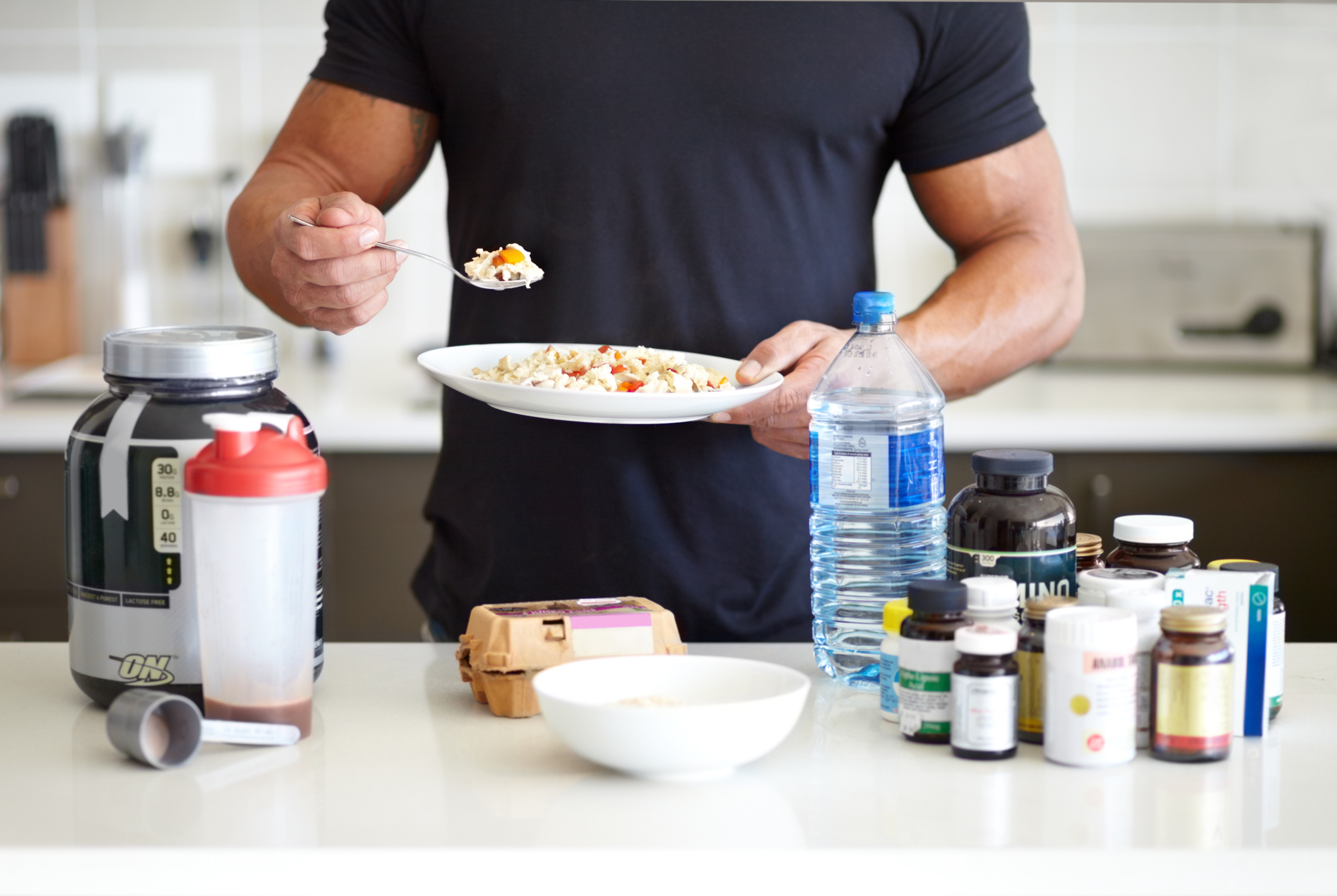If you have been diagnosed with hypogonadism or low testosterone, your doctor might recommend testosterone replacement therapy (TRT) for you. TRT involves the use of testosterone medications, such as testosterone gels, depo-testosterone injections, and testosterone patches, which can increase testosterone levels in the body and improve sexual health, mood, and overall well-being. While TRT can be helpful on its own, you can maximize the benefits by following a healthy diet.
How Diet Influences Testosterone
A balanced diet is crucial for optimal sexual health, performance, and functioning. We’ve already discussed how the hypothalamic-pituitary-gonadal (HPG) axis needs to be functioning properly to ensure that the body is producing the right amount of testosterone. Any type of nutrient deficiency, especially of zinc, magnesium, vitamin D, and polyphenols, will affect the HPG axis and therefore impair testosterone production.
In general, include these foods to add antioxidants to your diet and prevent nutritional deficiencies that can cause low-T:
- lean meats
- fish
- shellfish
- dark, leafy vegetables
- avocadoes
- eggs
- berries and cherries
- pomegranates
Obesity is another factor that can disrupt the HPG axis and lead to decreased testosterone levels and sperm count. Obesity causes changes in the communication between the brain and hormone-producing glands, which disrupts testosterone production. Consuming fewer carbs, saturated fats, and sugary foods is recommended to help maintain healthy testosterone levels.
Nutrients important for testosterone production
Zinc
An essential mineral for the human body, zinc is vital for the proper functioning of the male reproductive system. It helps in the development of sexual organs, sperm production and movement, and hormone synthesis. Zinc enables the activity of the enzyme 5-alpha reductase which converts testosterone to its active form, dihydrotestosterone. Zinc deficiency thus results in impaired testosterone synthesis.
The recommended daily intake of zinc for an adult male is 11 mg. Foods that are rich in zinc include:
- seafood, such as oysters and crabs
- beef
- fortified breakfast cereals
- oats
- eggs
- dairy products
Magnesium
Your body needs magnesium to maintain healthy testosterone levels because it decreases oxidative stress and has been proven to boost testosterone bioactivity. Oxidative stress is caused by an imbalance between your body’s antioxidant defenses and free radicals. Antioxidant and magnesium-rich foods fight oxidative stress and inflammation that lower testosterone levels, making it important to include antioxidant foods in your diet.
The average adult male needs around 400-420 mg of magnesium daily. Good sources of magnesium include:
- green leafy vegetables, such as spinach and broccoli
- legumes, particularly peanuts, and black beans and kidney beans
- nuts, especially almonds and cashews
- pumpkin and chia seeds
- whole grains
- fortified breakfast cereals
- bananas
- tap, mineral, and bottled waters
Vitamin D
Vitamin D is extremely important for bone formation and growth, calcium homeostasis, and the immune system. In men, vitamin D plays a part in fertility and maintaining testosterone levels. The vitamin D receptor (VDR) and vitamin D metabolizing enzymes are present in the testicles and sperm cells of adult men, making the vitamin vital for sperm production and optimal functioning of the male reproductive system. Research also shows that supplementation of vitamin D increases testosterone levels in men with hypogonadism.
An adult male requires between 15 mcg (600 IU) and 20 mcg (800 IU) of vitamin D on a daily basis. The following are good sources of vitamin D:
- sunlight
- cod liver oil
- Fatty fish such as trout, salmon, and sardines
- mushrooms
- fortified milk (cow’s, soy, oat, almond)
- fortified cereals
- eggs
- beef liver
Diet tips for those on TRT

Get enough protein
Testosterone deficiency can cause considerable loss of muscle mass and negatively affect your physique. TRT helps with gradually restoring this, but to build more muscle mass you need a positive muscle protein balance. The daily recommended protein intake for adults is between 1.4–2.0 g of protein per kilogram of body weight per day (g/kg/d) and this is usually sufficient to maintain your body composition.
Good sources of protein for men on testosterone replacement therapy (TRT) include:
Lean meats: Choose chicken and turkey, both great sources of lean protein, to avoid consuming extra saturated fat from other animal meat sources.
Fish: Fatty fish like salmon, tuna, and mackerel are rich in healthy omega-3 fatty acids, that help reduce inflammation and support testosterone and fertility.
Eggs: Eggs are a great source of high-quality protein and contain nutrients like vitamin D and choline which maintain your testosterone levels.
Dairy: Low-fat and unsweetened dairy products like milk, yogurt, and cheese are good sources of protein and also calcium and vitamin D.
Legumes: If you’re looking for plant-based protein, beans, lentils, and peas are great sources. They also contain fiber, which keeps the digestive tract healthy.
Nuts and seeds: Nuts are rich in protein, alpha-linolenic acid (ALA), zinc, magnesium, selenium, folate, vitamin E, and antioxidants which prevent sperm from getting damaged and maintain their structure. Research has shown that walnuts, in particular, improve the quality of sperm and male fertility. Walnuts, almonds, peanuts, pumpkin seeds, and chia seeds are all good sources of protein and healthy fats.

Select supplements wisely on TRT
Adding the right supplements to a healthy diet can also help boost testosterone levels. But with so many unregulated varieties on the market, it’s best to stick to supplements backed by scientific research. Zinc, vitamin D, l-arginine, mucuna (Mucuna pruriens), and ashwagandha (Withania somnifera) supplementation has been shown to alleviate symptoms of low testosterone, and in some cases T levels, in randomized clinical trials.
In several studies, l-arginine supplements (from 1,500 to 5,000 mg) improved hypogonadism symptoms ranging from erectile dysfunction to sexual satisfaction and orgasm quality. According to a study, daily supplementation of 5000 mg of powdered mucuna seed over 12 weeks increased sperm count and testosterone levels in men with low sperm and low T. Ashwagandha improves male fertility through three mechanisms: its anti-inflammatory and antioxidant properties; decreasing the main counterregulatory hormones of testosterone, such as cortisol; or changing the activity of enzymes associated with testosterone production.
Though it may be tempting to try out supplements to enhance testosterone on your own, we recommend first consulting with your doctor administering TRT to prevent any adverse interactions and decide whether the supplements will be effective in your specific case.
Cut down on sugar-sweetened food and beverages
To boost declining levels of testosterone, avoid food and drinks high in sugar. When blood glucose levels rise after a high-calorie meal, testosterone levels decrease and oxidative stress increases. This affects the function of sperm mitochondria, which are impacted by oxidative stress and testosterone levels, leading to decreased male fertility and sexual performance.
High sugar consumption will worsen symptoms of hypogonadism and possibly interfere with your testosterone therapy. Calorie-dense diets will make you put on weight faster in the form of adipose (fat) tissue, not muscle mass, further disrupting your TRT journey.
Excess adipose tissue in the body also causes an increase in the activity of aromatase, the enzyme responsible for converting testosterone to estradiol. This compounds the decrease in testosterone levels in the body.
Avoid processed food
Processed food is any foodstuff that has been modified from its original form to add ingredients, enhance its flavor, make it easier to eat, or extend its shelf life. This usually includes added salt, sugars, sweeteners, fats, preservatives, colors, or emulsifiers. Processed and ultra-processed food often contains artificial trans fats, also called industrial trans fats or partially hydrogenated fats, which are dangerous for your health. These fats are created by chemically modifying vegetable oils to remain solid at room temperature.
Consumption of highly processed food is the reason behind the obesity epidemic and the rise in heart disease, diabetes, and cancers. The intake of trans fatty acids from processed food also leads to lower total testosterone concentrations and decreased sperm counts in men, according to research. Topmost on the list of foods to avoid are processed meat and processed dairy products.
Switch from plastic containers and bottles to glass or steel
Certain environmental factors, such as endocrine-disrupting chemicals (EDCs), can also affect your hormone levels. EDCs are usually estrogens and estrogen-like factors that can be found in certain plastic containers and bottles and are known to have an antagonistic effect on testosterone which can interfere with the therapeutic benefits of TRT.
Avoid using plastic containers and bottles for storing or consuming food and beverages, especially anything acidic or fatty. This is because acidic and fatty substances can cause the plastic to leach chemicals that mimic estrogens and disrupt the hormone balance in the human body.
Instead, use glass, ceramic, or stainless steel containers that are free from harmful chemicals and can preserve the integrity of your hormones, particularly testosterone. These precautions may seem inconvenient at first but over time they can optimize the effectiveness of testosterone therapy and minimize risks associated with environmental estrogens.
Disclaimer:
The opinions shared in this article belong to the author and, like all content on Gambit’s Health Hub, should not be considered a replacement for professional medical advice, diagnosis, or treatment. If you have any health-related inquiries, consult with your preferred healthcare professional or visit a licensed, Canadian physician through Get Gambit for a supported condition.
This article has been medically reviewed and co authored:
Dr. Taneer Ahmed, MBBS, MS and Sheereen Hassib, RD, Msc.